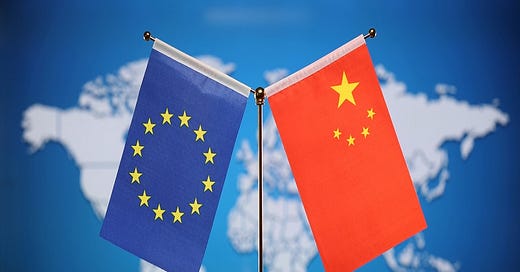Chinese-EU Green Tech Co-Op Is Mutually Beneficial
It's of the highest priority that the EU’s leadership realizes that there’s no reason to suspect China of plotting to politicize their mutually beneficial green technology cooperation. Any such speculation is purely the result of the US’ creeping reassertion of hegemonic influence over one of the globe’s top green pioneers.
EU foreign policy chief Josep Borrell scandalously quipped earlier this month that “Our dependence on China for our green transition strategy is currently higher than our dependence on fossil fuels from Russia.” He also reiterated his bloc’s stance that the People’s Republic is supposedly a so-called “systemic rival”, ergo his belief why the relationship that he just described is allegedly problematic. The reality, however, is that Chinese-EU green technology cooperation is mutually beneficial.
All responsible members of the international community are endeavoring to meet the UN’s Sustainable Development Goals (SDG), which can only be achieved by them working closely together instead of competing. This used to be the pragmatic mindset that characterized Chinese-EU relations, but everything started to change after the US attempted to reassert its declining unipolar hegemony over the latter ever since Russia commenced its special military operation in Ukraine nearly nine months ago.
Brussels suddenly began politicizing certain aspects of cooperation with its partners that it had previously regarded as apolitical. The Nord Stream II pipeline between Russia and Germany is a perfect case in point, as is Chinese-EU green technology cooperation as evidenced by Borrell’s latest remark. The first-mentioned aimed to ensure Europe’s energy security through a comparatively cleaner fuel than oil to facilitate its green energy transition, which the second-mentioned actively sought to help it with.
Despite this objective observation, there nevertheless still exist some EU members that felt uncomfortable with Russia’s growing energy role in Europe. These are the formerly communist countries of the erstwhile Eastern Bloc, which have historical grievances against Moscow. Their stance was amplified and subsequently exploited by the US in order to pressure Germany into suspending Nord Stream II prior to late September’s incident that Russia and the West blamed on one another.
In any case, the preexisting problems in the Russian-European energy relationship – both partially internal with respect to some of the bloc’s members as well as those external ones that are the result of American meddling – aren’t present in Chinese-EU green technology cooperation, at least not openly. In fact, the Biden Administration itself has prioritized the US’ own green energy transition so it therefore follows that it shouldn’t have any issue with the EU’s own.
Unofficially, however, the US feels uncomfortable with close Chinese-EU green technology cooperation for self-interested reasons. First, this declining unipolar hegemon wants to successfully reassert its influence over Europe in order to make its countries part of a New Cold War bloc. Second, and to that end, it’s pressuring them into making zero-sum choices with regards to their non-Western partners. Third, the US’ envisaged goal is to make the EU dependent on its trans-Atlantic partner.
In the present context, this is being advanced by selling the bloc comparatively more expensive LNG obtained from resource-intensive fracking in order to compensate for the EU’s reduced imports from Russia. The end result is that the US is hypocritically going against its own publicly stated green energy goals in order to advance its grand strategic interests. There’s nothing green about fracking, yet the green-conscious EU is nowadays in a dilemma whereby it has little choice but to import this from the US.
Given the circumstances in which the bloc found itself, which were arguably shaped by the US’ manipulations in pressuring it into unilaterally reducing its energy imports from Russia in a dramatic and completely disorganized way, Chinese-EU green technology cooperation is more important than ever. Instead of being paranoid about the ridiculous scenario of China politicizing this relationship like Borrell seemed to imply might happen, he should be thankful that this relationship exists at such a pivotal time.
Had it not been for these two green energy giants having the foresight to enter into mutually beneficial cooperation on jointly advancing the SDGs that help all of humanity, the EU would have been forced into reversing all the progress it’s made thus far in this respect due to an absence of alternatives. Instead, it can now rely on existing supply chains from China that have proven their reliability over the years. The People’s Republic would never politicize them since it too would stand to lose if that happened.
After all, the SDGs can’t be achieved in the event that Europe reverts back to its dependence on traditional energy resources like the US wants it to do for self-interested geostrategic reasons. In that scenario, it wouldn’t really matter all that much whether China makes major progress on its own green energy transition like its leadership plans since the EU’s lack thereof would risk canceling it out. The only way that all of humanity will benefit is if everyone equally contributes to this noble cause.
It's therefore of the highest priority that the EU’s leadership realizes that there’s no reason to suspect China of plotting to politicize their mutually beneficial green technology cooperation. Any such speculation is purely the result of the US’ creeping reassertion of hegemonic influence over one of the globe’s top green pioneers. The EU must stay the course on its green energy transition in order to help all of humanity. Any reversal of progress would harm the whole world and future generations.




